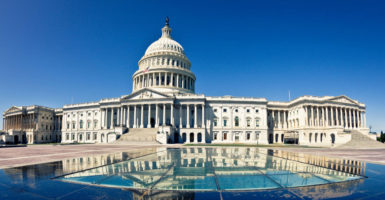At the heart of the decision by the U.K. to leave the European Union was an evident desire of the British people to restore economic freedom, self-determination, and independence. Congress should take note: Americans want the same thing.
Fundamentally, the Brexit campaign has been about pursuing the freedom to choose, driven by the proven conviction that greater freedom will lead to greater entrepreneurial dynamism and prosperity. The British people made it clear that they want to “exit” from the straightjacket of senseless overregulation imposed by unelected bureaucrats.
America has become a land of overregulation, and the regulatory burden has been increasing at an alarming pace since 2008.
The European Union as a whole has been economically stagnant and its long-term growth potential has flagged.
Poor economic decisions have been imposed on member nations, and trans-European institutions have repeatedly proven incapable of reform.
In fact, “the shocking unfree state of the EU” has been well documented in The Heritage Foundation’s Index of Economic Freedom, the annual study on the entrepreneurial health of the countries around the world. As succinctly noted by The Daily Telegraph, “the EU is patently not an optimal political and economic area. It continues to exist only out of inertia.”
For Congress, the momentous victory of the Brexit campaign should be yet another strong reminder on the importance of implementing regulatory reforms in the United States. America has become a land of overregulation, and the regulatory burden has been increasing at an alarming pace since 2008.
Echoing The Heritage Foundation’s findings on the startling rise of red tape, The Economist unequivocally pointed out the current status of America’s entrepreneurial environment:
America is meant to be the home of laissez-faire. Unlike Europeans, whose lives have long been circumscribed by meddling governments and diktats from Brussels, Americans are supposed to be free to choose, for better or for worse. Yet for some time America has been straying from this ideal.
Indeed, this unfortunate drifting away from “free to choose” has been the prime culprit in America’s startling decline in economic freedom and overall competitiveness, as documented by The Heritage Foundation’s “Economic Freedom in America.”
Substantial expansion in the size and scope of government under the Obama administration—including through new and costly regulations in areas like finance, health care, and the environment—has hit wide swaths of the economy, affecting almost every American in some way and reducing opportunities for private production, innovation, and investment. Worse, corrupting our free market system, the growth of government has been accompanied by increasing cronyism that has undermined the rule of law and perceptions of fairness.
While Congress should support the British people as they embark the work of disentangling themselves from the EU’s regulatory straightjacket, equally critical is that Congress must act on steps to keep excessive regulation from harming America’s entrepreneurial pulse and restore America’s economic freedom.
























